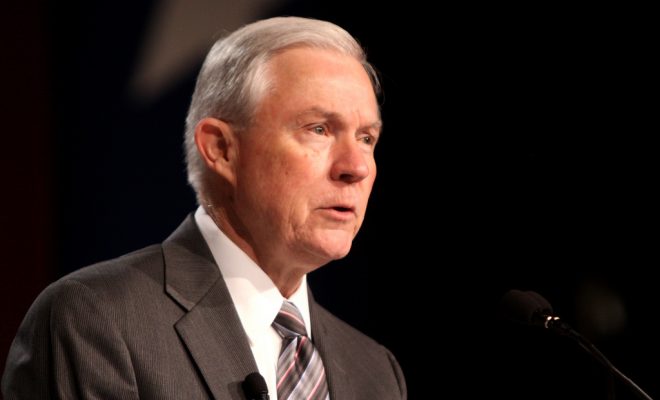 Image Courtesy of Gage Skidmore; License: (CC BY-SA 2.0)
Image Courtesy of Gage Skidmore; License: (CC BY-SA 2.0)
Cannabis in America
Will the Trump Administration Crack Down on Marijuana?
In a press conference on Thursday, White House Press Secretary Sean Spicer suggested the Justice Department will increase its enforcement of federal marijuana laws. Marijuana is banned at the federal level, but is legal, recreationally or medically, in 28 states and D.C. However Spicer did say the president sees a “big difference” between recreational and medical marijuana.
“I do believe you will see greater enforcement of it,” Spicer said, referring to the federal marijuana ban. “When you see something like the opioid addiction crisis blossoming in so many states around this country, the last thing we should be doing is encouraging people,” he added. “There is still a federal law that we need to abide by when it comes to recreational marijuana and drugs of that nature.”
Spicer’s remarks seem to contradict comments Trump made during the campaign. At a rally in October 2015, Trump said marijuana policy is a “state-by-state” issue. Trump hardly has fixed positions on certain issues, however, and his views on marijuana enforcement might have evolved since late 2015. Spicer’s comments also implied that marijuana use can lead to more dangerous drug use, like opioids. There is limited, if any, evidence to support the so-called “gateway drug” theory.
Marijuana advocates have been wary about the new attorney general, Jeff Sessions, because of anti-marijuana comments he made when he was a senator from Alabama. But during his hearing last month, Sessions said he “won’t commit to never enforcing federal law” but added that doing so is “a problem of resources for the federal government.” That there are more pressing issues than marijuana enforcement on the Justice Department’s agenda–narcotics trafficking and criminal justice, for example–might be the best buffer against a clamp down on marijuana use in states where the practice is legal.
The Congressional Cannabis Caucus, created last week and co-chaired by a bi-partisan group of congressman, released a statement in response to Spicer’s comments. “We hope today’s comments do not reflect the views of the President and his administration,” said the group, which consists of Reps. Earl Blumenauer (R-OR), Dana Rohrabacher (R-CA), Jared Polis (D-CO), and Don Young (R-AK). “We stand ready to educate this administration on the need for more sensible marijuana policies and share the many experiences states have had with the legalization of cannabis.”
In 2013, the Deputy Attorney James Cole, responding to the recent recreational marijuana legalization in Washington and Colorado, issued a memo that directed the federal government to consider state laws when enforcing the federal marijuana ban. The Cole Memo reiterated that marijuana trafficking and related criminal activity–such as selling to minors–should be aggressively enforced. Indeed, the Obama Administration conducted raids on growing facilities in states that legalized the drug. But the Cole Memo instructed deference to state law when it comes to possessing or selling small amounts of marijuana.
For all of the uncertainty Spicer’s comments cast on marijuana enforcement, he made clear that the president respects and understands the medical utilization of marijuana. “The president understands the pain and suffering that many people go through who are facing, especially terminal diseases,” Spicer said, “and the comfort that some of these drugs, including medical marijuana, can bring to them.








Comments